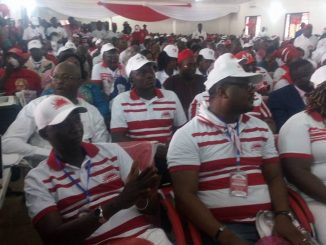
Vietnam for instance has made huge achievements in her agriculture sector, contributing to food security and economic development, being one of top exporters of rice. China has hundreds of millions of farmers and a major producer of rice, tea and even wheat, with its agriculture sector being a major player in the country’s economy.
Global happenings have led to huge economic challenges for not just developing nations, but even world powers. This has led to countries shifting their development path especially in terms of what they had depended on for growth.
Oluwadamilare Odu-Onikosi, on ‘Boosting Nigeria Economy through Agriculture’ called for a shift of his country’s concentration on her oil sector to the agricultural sector.
Such action, he said, would help “bring about a shift on a monoculture economy, diversifying from over-reliance on crude-oil…provision of food and raw materials through the development of agriculture to the teeming population and the development of the manufacturing sector, discourages heavy dependence on importation…”
Sierra Leone recently introduced some expenditure measures aimed at addressing the challenges left by the ebola outbreak and of course, the drop in price of commodity like iron ore.
Notwithstanding the denial in certain opposition quarters, it is evident that the ebola outbreak and the drop in price of ore had adverse effects on us as a country.
That said, we also should work towards making use of the agriculture sector, given its potential for economic growth. Our dependence on import could be reduced in the long term, if not now, by engaging on intensive agricultural activities.
The country’s economy largely depends on agriculture and mining.
Agriculture “accounts for almost half of GDP (46% in 2008) and provides employment for about 75% of the economically active labour force (15-64 years) in the country (with women predominant). (Source: Agricultural and Rural Development Statistics in Sierra Leone – Key Aspects of Institutional Arrangements & Performance.)
Sierra Leone has 5.4 million hectares (74%) potentially cultivatable land. It benefits from a number of enviable natural advantages; strategically located with one of the largest natural harbors in the world.
Government, after 2007, increased budgetary allocation to the sector to 7.7% in 2009 which it had met at a paltry 1.6% thus making agricultural productivity very low. In fact, President Koroma, in 2009, called for a move from subsistence to commercial agriculture and adding value so as to realize “maximum benefit from the richness of our soil.”
Improving on productivity is key to effectively utilizing the potentials of the sector. In a 2016 interview, Professor Monty Jones, Agriculture Minister told me, the country’s productivity level was low, compared to other countries in Africa.
Increase in production and productivity through the value chain-from Research, to Extension, to Adaption, to Value Addition to Market is vital and strategic given the long term impacts.
This is where the Sierra Leone Agricultural Research Institute (SLARI) could play a role in identifying the key commodities; pathways for adoption; pathways to the market and eventually increasing yield of those commodities, a view also held by the minister.
SLARI, as the minister said, should “work in a much more collaborative, integrated fashion and in much more innovative ways and approaches that will ensure maximum impact on the ground“.
Making the sector an ‘engine’ for socio-economic growth and development involves commercializing the sector and encouraging the promotion of private sector investment; it can help in motivating the required speeding up in agricultural productivity.
Odu-Onikosi, called for the development of Agricultural Business Entrepreneurship and farm-skills acquisition centres and ensuring Agricultural Subsidy and tax holidays for investors in his country, Nigeria. We have indeed made progress in ensuring an enabling tax environment for investors.
With attention to the sector, it eventually would help in job creation and reduce our level of dependence on import especially, of rice, which is our stable food.
Agriculture can be an engine of growth. We should all come on both, not just a question of what government could do.




